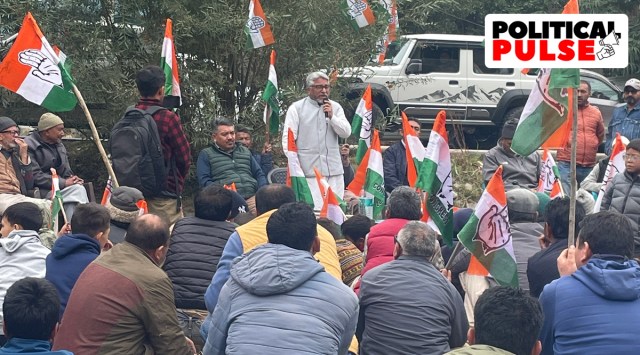Kargil hill council polls tomorrow, separation from J&K, lack of opportunities on voters’ minds
From lack of jobs to irrigation to need for schoolteachers, voters list their grievances. Some leaders say controlling the council is imperative to safeguarding the region’s interests.
 Though the constituency has no BJP candidate, and despite a pre-election seat-sharing arrangement, the Congress’s principal opposition in the constituency is National Conference. (Express)
Though the constituency has no BJP candidate, and despite a pre-election seat-sharing arrangement, the Congress’s principal opposition in the constituency is National Conference. (Express) A cavalcade of cars makes its way through the narrow roads of Kargil Market, a voice blaring from the loudspeaker mounted on top of the first car. It is Khadim Hussain, an advocate and the Congress candidate from the Baroo constituency in the Ladakh Autonomous Hill Development Council (Kargil) elections making his pitch to voters.
The cavalcade passes through the village of Minjee and stops at a field with stubble still jutting out of the ground. There is no elaborate arrangement. Party workers pull a microphone and portable speaker out of a car and Hussain begins addressing a small crowd in Balti, the local language. It is Monday, the last day of campaigning for the hill council polls and the conversation is dominated by the creation of the Union Territory of Ladakh in August 2019 and the fallout of the Centre’s decision.
 On the streets of Kargil, young voters say their biggest challenge in the last four years has been the lack of jobs that they had access to when Ladakh was part of the erstwhile state of Jammu and Kashmir. (Express)
On the streets of Kargil, young voters say their biggest challenge in the last four years has been the lack of jobs that they had access to when Ladakh was part of the erstwhile state of Jammu and Kashmir. (Express)
The election is scheduled to be held on Wednesday. More than 95,000 voters will elect 26 councillors to the governing body that plans and executes developmental work in this region.
Campaigning for Khadim Hussain is Haji Asgar Ali Karbalai, one of Ladakh’s senior Congress leaders. Though the constituency has no BJP candidate, and despite a pre-election seat-sharing arrangement, the Congress’s principal opposition in the constituency is National Conference (NC) candidate Haji Hanifa Jan.
Karbalai’s attack on the BJP is sharp and firm. “The Congress has never pushed the Hindu-Muslim narrative, the BJP is a divisive party and all they want is to further disempower our society,” he says.
 Congress candidate Khadim Hussain’s cavalcade of cars. (Express)
Congress candidate Khadim Hussain’s cavalcade of cars. (Express)
The control of the hill council, some leaders say, is imperative to safeguarding the interests of the region “from the control of the Centre through the L-G (Lieutenant-Governor) administration.”
On the streets of Kargil, young voters say their biggest challenge in the last four years has been the lack of jobs that they had access to when Ladakh was part of the erstwhile state of Jammu and Kashmir.
“We had a stake in the government, we had a reservation under the ST (Scheduled Tribes) category and we could apply for the state’s civil service. Now that we don’t have a Public Service Commission, people who are finishing degrees are stuck for a lack of opportunities,” says Zainab Ali, a student at the Government Degree College.
With the work season in Ladakh lasting four to six months, private opportunities are also few and far between. “There isn’t even a UT-level recruitment board,” she says.
Ghulam Mehdi, a 60-year-old standing at the periphery of an NC rally, says, “I grow barley because the ground is not fertile for anything else. The issue is irrigation because there is no ground water and lift irrigation schemes have not been given for our village.”
These irrigation schemes, pulling water from the river above to the fields, are in the purview of the hill councils and, with limited agricultural land available, crucial for locals.
The last village on LoC
In a remote corner of Kargil, 10 km from the town, lies the Hunderman village on the banks of the Suru River. The last village on the Line of Control, it has borne the brunt of wars between India and Pakistan. A large part of the village migrated to Gilgit-Baltistan across the LoC, leaving 36 households and 162 voters behind. Here, too, the conversation of empowering the council is on top of people’s minds. “We need teachers for our school. Currently, the school is being run through four teachers teaching all subjects,” says Imtiyaz Ansari, a resident. On Wednesday, locals will cast their vote at the middle school.
 Voters in the area say they miss the representation that having an Assembly guaranteed them. (Express)
Voters in the area say they miss the representation that having an Assembly guaranteed them. (Express)
In the Poyen constituency, of which Hunderman is a part, there is a four-way contest between the BJP’s Haji Anayat Ali, NC’s Mohammad Amin, Congress’s Murtaza Ali, and Aam Adam Party’s Mohammad Hussain.
Haji Anayat Ali, a former chairman of the Jammu and Kashmir Legislative Council in the former state of J&K, and now the face of the BJP’s Kargil campaign, acknowledges the NC-Congress edge in the election.
“Historically, there has been a Congress and National Conference hegemony in Ladakh and we want to break that,” he said last month after filing his nomination. There are 17 candidates on the party’s ticket in this election. He accepted at the time that it was a challenge to contest on a BJP ticket but claimed BJP had been successful in running J&K. “Kashmir has seen a return of Muharram processions, none of the local parties were able to do this,” he said.
At Karkit village in Chuliskamboo constituency, former Sarpanch and Block Development Council (BDC) chairperson Khatija Banoo is one of the only two women candidates in the fray. The 37-year-old spent the last three years fighting for NOCs from various departments to install a cell tower in her village. With that achieved, she is now contesting on a Congress ticket against NC’s Altaf Hussain, who is the incumbent councillor from the area, and Independent Reyaz Ahmad.
Here too, the anxieties of Ladakh’s separation from J&K are playing out. “The future of our youth has been snatched by taking away the employment opportunities that we had a stake in, with J&K,” says Banoo. Though she admits that funding for the Union Territory has increased several-fold in the new set-up, matters of land ownership and governance through bureaucracy “are big issues”.
Voters in the area say they miss the representation that having an Assembly guaranteed them. “We had our MLAs who would speak for us in the Assembly. The council is good for developmental issues but the impact of speaking in an Assembly was different,” says 62-year-old Haji Hussain.



- 01
- 02
- 03
- 04
- 05




























